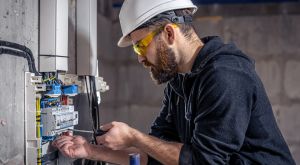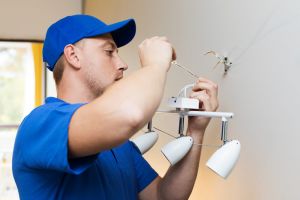Electrical work can be dangerous if not conducted properly and with due care and attention. Dealing with electricity of course poses a risk of electrocution to yourself, but a faulty connection or exposed wiring could also create a fire hazard – putting your entire family at risk.
Accordingly, it is illegal for any person without an appropriate licence to do electrical work anywhere in Australia. Even if you know what you’re doing, if you conduct unlicensed work, you are liable for a heavy fine and you may void any home or contents insurance on your property. So you’ll need to know what to look for in an electrician, with this Canstar Blue guide exploring all the licensing information needed for you to hire the right electrician for the job.
Most important things to look for when hiring an electrician
When you’re looking for an electrician in your area, the natural go-to source of information is probably your favourite internet search engine. However, anyone can pay to be at the top of Google – it’s not difficult for potentially dodgy, unlicensed operators to get their name out there, particularly if they’re willing to do the work on the cheap. So what should you be looking for to help find the best option? Things to consider when looking to hire an electrician include:
- References
- Written Estimates
- Licensing and qualifications
1. References

Word-of-mouth and customer reviews can go a long way in proving the efficacy of an electrician. Above all, the experience of the customer is the most important factor in finding out whether an electrician is the right fit for the job. Whether it’s finding an electrician through friends, or looking online to sort through the best-reviewed tradesman, the customer-experience is a valid way to prioritise an electrician.
2. Written estimates
Most high-quality electricians will provide you with an estimate of the costs before they begin work, as well as detailed information on the intricacy of the job, and the timeframe. If your electrician does not provide this it may be a warning sign of things to come, as this is a regulation of the job.
3. Licensing and qualifications
It’s in your best interests to ensure an electrician is correctly licensed before choosing to hire them. The licencing and qualifications for electricians, and how they’re obtained, differ for each state. The details on qualifications and licencing are detailed below.
- New South Wales
- Victoria
- Queensland
- South Australia
- Western Australia
- Northern Territory
- Tasmania
- Australian Capital Territory
Electrician Licencing and Qualifications in New South Wales
New South Wales electricians must hold a licence under the Fair Work Commission in order to conduct any electrical work, regardless of the size or type of premise. When the electrical work required is incidental to another trade (i.e. computer technician), the worker may need to hold a restricted electrical licence.
Keep in mind there are a number of stringent licencing requirements in New South Wales and some specific electrical installations will require workers to hold multiple licences. For example, if you’re having an air conditioner installed, in addition to an electrical licence, the tradesperson will require an air conditioning and refrigeration licence from Fair Trading (NSW), as well as a refrigerant licence from the Commonwealth Government.
An electrician must by law issue a compliance certificate or CCEW after the work is completed. This is an insurance the work has been completed to the required safety standards. You can search licensed electricians using the New South Wales service licence search.
Electrician Licencing and Qualifications in Victoria
All standard electrical work in Victoria, such as installations, repairs and wiring requires an electrician’s licence. If you are shown an electrician (supervised) licence, that tradesperson is only able to carry out electrical work under supervision by someone fully qualified. To carry out electrical installation work, a licensed electrician must also be registered as an electrical contractor.
After your work has been completed, you must be provided with a Certificate of Electrical Safety (COES), which you should hold onto. This is recognition by the installer that they have operated in accordance with safety guidelines in Victoria. It is also used by Energy Safe Victoria as evidence of negligent conduct by the tradesperson if it is later found that the electrical work did not in fact comply with safety standards.
You can contact Energy Safe Victoria to find out if your electrician is licensed.
Electrician Licencing and Qualifications in Queensland

Electrician licencing in Queensland is a bit less clear-cut compared to some other states. There are two types of electrical licences – electrical contractor licences and electrical worker licences. A tradesperson must hold an electrical workers licence in order to carry out electrical work. To contract their services, the tradesperson must also hold an electrical contractor licence.
Queensland Electrical contractor licence
The work a tradesperson can contract depends on their licence category. There are two levels of contractor licences in Queensland– Gold and Silver.
- Gold: An electrical contractor with a gold licence is permitted to perform all types of electrical work for the public. For example, installation and wiring of electrical equipment.
- Silver: The holder of a silver electrical contractor licence is restricted to the testing, maintenance and repair of the type and voltage of electrical equipment printed on the reverse of the licence. This licence does not allow the person to install electrical equipment.
Queensland Electrical worker licence
Similar to contractor licences, there are two types of electrical worker licences – Blue and Green.
- Blue: The Blue licence is the standard licence, allowing the holder to perform electrical work. The electrical work the licence class permits them to perform will depend on the one or more licence classes listed on the front of the card, with licence classes including electrical mechanic, electrical linesperson and electrical fitter. For the purpose of home electrical needs, the worker will only need to be licenced as a fitter/mechanic.
- Green: A Green licence means the worker is restricted to particular types of equipment and types of work, usually given to those whose electrical work is minor and incidental to another trade. A restricted electrical work licence does not cover the installation of electrical equipment.
When an electrician has finished work on your property they are required by law to supply either a ‘certificate of testing and safety’ or a ‘certificate of testing and compliance’ depending on the type of work they performed.
You can search licensed electricians using the Queensland Governments trade person search.
Electrician Licencing and Qualifications in South Australia
Electrical work in South Australia requires a tradesperson to hold an ‘electrical licence’. In order to contract services as an electrician, the person also requires a contractor licence.
Electricians must issue a certificate of compliance to the consumer on completion of any electrical work. Similar to the other states, this is a statement by the electrician to say the work has been satisfactorily completed.
You can search licensed retailers using the South Australian Government occupational licences search.
Electrician Licencing and Qualifications in Western Australia
Much like South Australia, electricians in Western Australia require an Electrical Licence, which is issued from the EnergySafety Department of Mines, Industry Regulation and Safety.
Your electrician will also be required to possess a Construction Induction Card, also known as a White Card. These are issued from the WorkSafe division of the Department of Mines, Industry Regulation and Safety, where you can find authorised training organisations for this qualification.
Electrician Licencing and Qualifications in Northern Territory
To be able to perform electrical work in the Northern Territory, tradespeople must have an Electrical Contractors Licence. This can be sourced through the Electrical Workers and Contractors Licencing Board.
An electrician that doesn’t have this permit should not be going anywhere near your job that requires completion.
Electrician Licencing and Qualifications in Tasmania
There are four types of licences attainable in Tasmania, including:
- Electrical practitioner licence
- Electrical contractor licence
- Electrical restricted licence
- Electrical provisional licence
Electricians in Tasmania require a Practitioner Licence to perform any sort of electrical work, with the contractor licence required if the electrician intends to make money from their services. The restricted licence entails the tradesperson can only work on select utilities, and the provisional licence is required for anyone from overseas.
Electrician Licencing and Qualifications in the ACT

Electricians in the ACT must be registered under the Construction Occupations (Licensing) Act 2004. From here, there are two types of licences: restricted and unrestricted.
An unrestricted licence holder is able to complete any task without supervision, however a restricted licence comes with a variety of shortcomings. A selection of electrotechnology operations cannot be performed if your electrician has a restricted licence. For more information, check out the ACT Electrician Licence factsheet.
How much do electricians cost?
Based on national averages, electricians can cost anywhere from $60 per hour, to $100 per hour. These price ranges can differ based on the complexity of the job, the type of job, and your location. Due to the different prices offered by electricians, it is best to search for electricians based on the details of your job, and your location.
At the end of the day though, regardless of how much an electrician may cost you, it’s a small price to pay to have a professional take care of some potentially dangerous work for those who aren’t trained in electricals. And if you’re looking to save money, you can always compare electricity providers to see if you can get a better deal.



Share this article